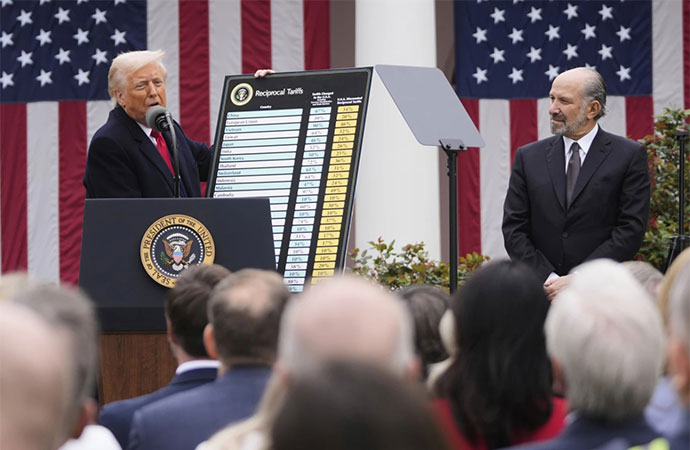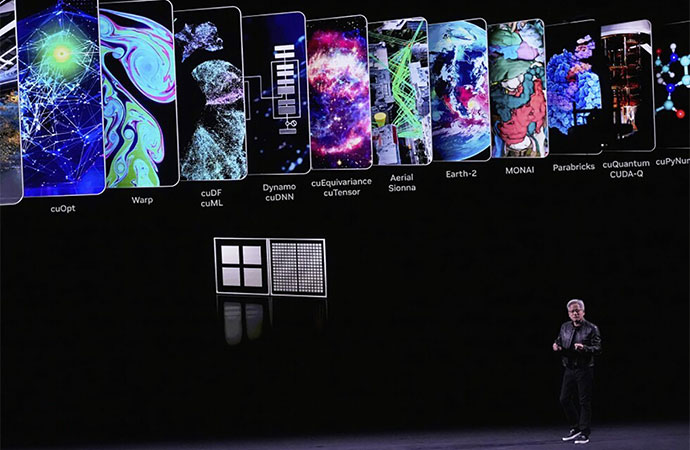Column

Photo: AP/UNB
The Trump administration has revised its tariff rate for all Bangladeshi products from 37% to 35%. The unilateral decision comes as part of the proposed imposition of reciprocal tariffs on goods from all countries which are imported into the United States. Bangladesh enjoys a significant trade surplus with the United States. The Trump administration has identified the American trade deficit with Bangladesh, which is worth US$6.2 billion, as a threat to the US economy. Trump sees non-tariff barriers as a hindrance for US exports. A recent letter to Chief Adviser Muhammad Yunus by President Donald Trump lays out that "there will be no Tariff if Bangladesh, or companies within your Country, decide to build or manufacture product within the United States, and, in fact, we will do everything possible to get approvals quickly, professionally and routinely - In other words, in a matter of weeks".
The Trump administration imposed a levy of 37% for all Bangladeshi goods on 2 April. An additional 10% levy has been charged for all goods while remaining tariffs were suspended. Tariffs are now set to come into force on 1 August after a 9 July deadline to reach a trade agreement was extended by three weeks. Bangladesh's commerce ministry is banking on a framework agreement for Least Developed Countries (LDCs) before concluding a trade deal with the Trump administration. Bangladesh enjoyed duty free access to the US market for its RMG products before the Obama administration suspended the GSP plus facility in 2013 over industrial safety concerns and labor rights issues. Since then, Bangladesh has sought to pursue labor reforms. The interim government set up a Labor Reform Commission to plan for wide ranging reforms. But proposed labor reforms have done little to assuage the Trump administration.
While ideally Dhaka would benefit from a zero-tariff scenario for Bangladesh's most important and largest export destination, Bangladesh is hoping for some kind of exemption or reduced rate of tariffs due to its position as an LDC economy. Millions of Bangladeshis are employed in key export sectors which are driven by demand from American consumers, particularly in garments, leather and fishing. The cost of increased tariffs would make Bangladeshi products more expensive for US consumers and potentially stifle export demand. Decades of economic progress can be turned back if a recession hits the economy as a result of a trade war.
The commerce ministry is also seeking a list of goods from the US Trade Representative which Washington wants for duty free access in the Bangladeshi market. Bangladesh imports US$2.2 billion worth of goods from the US each year, while Bangladeshi investment in the US market is negligible. Bangladesh was one of the first countries to be notified with a letter from Donald Trump along with Japan, South Korea, Indonesia, Tunisia, Serbia, Bosnia, Cambodia, Laos, Thailand, Malaysia, Kazakhstan, South Africa, and Myanmar. Reports indicate that sources in the Trump administration advised the interim government to prepare a "dream team" to negotiate a trade agreement.
The UK and US recently agreed on a framework agreement for tariffs. Donald Trump signed an order which would reduce tariffs for most UK goods, including cars, to a 10% levy. The UK steel industry faced a 50% tariff which London has requested Washington to bring down to a range between 25% and zero. The UK-US trade deal focuses on removing non-tariff barriers, particularly non-tariff barriers in the UK.
The Trump administration wants Bangladesh to reduce non-tariff barriers which in American eyes can amount to an overall 74% tariff on US imports into Bangladesh. Washington wants Dhaka to cut red tape which hinders doing business. Bangladesh has also considered duty free cotton warehouses and reduced levies for US-made medical equipment. The Trump administration is enforcing the United States Reciprocal Trade Act, which seeks to reciprocate heavy tariff and non-tariff barriers for US goods by reciprocally charging the importing country with a significant tariff. Bangladesh has to undertake significant reforms to its trade policy in order to head off the winds of tariffs blowing from the Trump White House.
Umran Chowdhury is Assistant Editor of the Dhaka Courier and a Research Associate at the Cosmos Foundation and Bay of Bengal Institute.

























Leave a Comment
Recent Posts
Pedaling Through the Mangroves ...
The journey from the bustling streets of Barishal to the serene, emera ...
Why the Interim Government mus ...
Two weeks out from what is expected to be a red letter day in the figh ...
Doesn’t matter who thinks what about Bangladesh deci ..
The Other Lenin
US President Donald Trump said his administration
Govt moves to merge BIDA, BEZA, BEPZA, MIDA